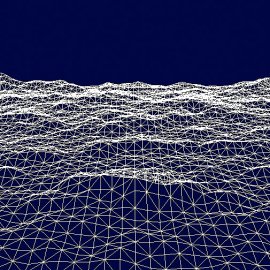Artificial Intelligence and the Ocean
-
English
-
ListenPause
WOR 448 Artificial Intelligence and the Ocean I’m Peter Neill, Director of the World Ocean Observatory. We hear much these days of “artificial intelligence” – such a strange phrase postulating that there is more than one form of intelligence, natural or artificial. The phrase intends to assert the implication that computers can analyze, operate, even predict and plan certain processes no longer requiring human intervention. The paradox, of course, is that this phenomenon is a human construct designed ultimately to replace human construct. So it goes, as science fiction turns into reality in the 21st century. We have discussed on World Ocean Radio various applications of such technology – how algorithms will provide autonomous control of ships at sea, loading and distribution of goods worldwide, aquaculture and agriculture, global observation, data collection and analysis, and much more, all at a level of increased efficiency and productivity and decreased cost. What’s not to like? There are some cries of outrage at the loss of human participation in all these activities, as if our hand on the wheel will contribute some humanistic additive to what is a purely mechanical function. But that argument has been lost some time ago – indeed inherent in the very invention of computers and the ensuing explosion of applications that somehow make our lives better through short-cuts and replacement of bank tellers, assembly line workers, and even artists who opt for technological manipulation in lieu of the human hand. This astonishing shift in how things are made and communicated will not cease. It is transforming how we receive our news, write and read our books, how we understand as much through images as words, and how we otherwise engage in the world of our neighbors, politics, work, finances, and ideas in the future. Once the world was just a stage; now it is a digital platform. How can nation states exploit digital platforms? I can’t remember where I heard this question, or who posed it, but by its structure it reveals the certainty that digital platforms, with all their algorithmic variety and ubiquity, are a new foundation on which all governments must build. Exploit this new structure and its mechanisms or die. And so we begin to compare the incorporation of this new reality into policy, national legislation, and international relations. China has chosen this path with massive energy and investment. The United States, where so much of this new world was created, hesitates in a time warp between nostalgia for global political and economic dominance and fear of change engendered. A nation that hesitates is lost. It is very interesting to think about these things in the context of the ocean. As we assert often on World Ocean Radio, the ocean is not a place of disconnection as are nation states with their particular histories, values, and behaviors that put national agendas first and foment competition and discord. The sea connects all things – through natural, social, and cultural relation to global needs: climate, fresh water, food, energy, health, security, governance, and the accommodation of cultural traditions. So it comes to my mind to pose a different question: how can digital platforms be used for the design and implementation of transnational goals and objectives? The incorporation of the ocean, indeed the fresh water/salt water continuum, as the essential paradigm for future survival demands the abandonment of nation-state thinking that precludes international acceptance of an integrated natural, financial, and social world as a means to sustainable systems, diminished conflicts, increased equity and justice for all. The success of social media communication provides an example. If the weekly content of World Ocean Radio, transformed into multiple digital communications platforms, can reach literally millions of people worldwide, then similar messaging can be used to inform and unite around challenges and solutions to maximum effect. When we speak here of creating a global community of “Citizens of the Ocean,” we are promoting transnational connection, advocating for the ocean worldwide, and united peoples from all nations around a new set of values, structures, and behaviors. The ocean is as wide, deep, and dynamic as human civilization. Ships were the tools of exploration, immigration, and acculturation. This astonishing reality, too, will not cease. And the role of digital platforms and algorithmic utility will expand exponentially. But to what end? How do we combine the two expressions, not of machines, but of the human hand and mind? How do we transform the ocean into the ultimate operating system for a successful, sustainable future of Aqua, our ocean planet? We will discuss these things, and more, in future editions of World Ocean Radio.
In this week's episode of World Ocean Radio, host Peter Neill outlines some of the various applications of the oft-times controversial artificial intelligence technologies employed at sea. And he asserts that since the ocean is a place of connection, we should be thinking of digital platforms as a way to design and integrate global systems for a successful and sustainable future.
About World Ocean Radio
Peter Neill, Director of the World Ocean Observatory and host of World Ocean Radio, provides coverage of a broad spectrum of ocean issues from science and education to advocacy and exemplary projects. World Ocean Radio, a project of the World Ocean Observatory, is a weekly series of five-minute audio essays available for syndicated use at no cost by college and community radio stations worldwide.
If you value World Ocean Radio, please consider becoming a Patreon Supporter today.
Image
Ocean surface model created using MATLAB
- Login to post comments



